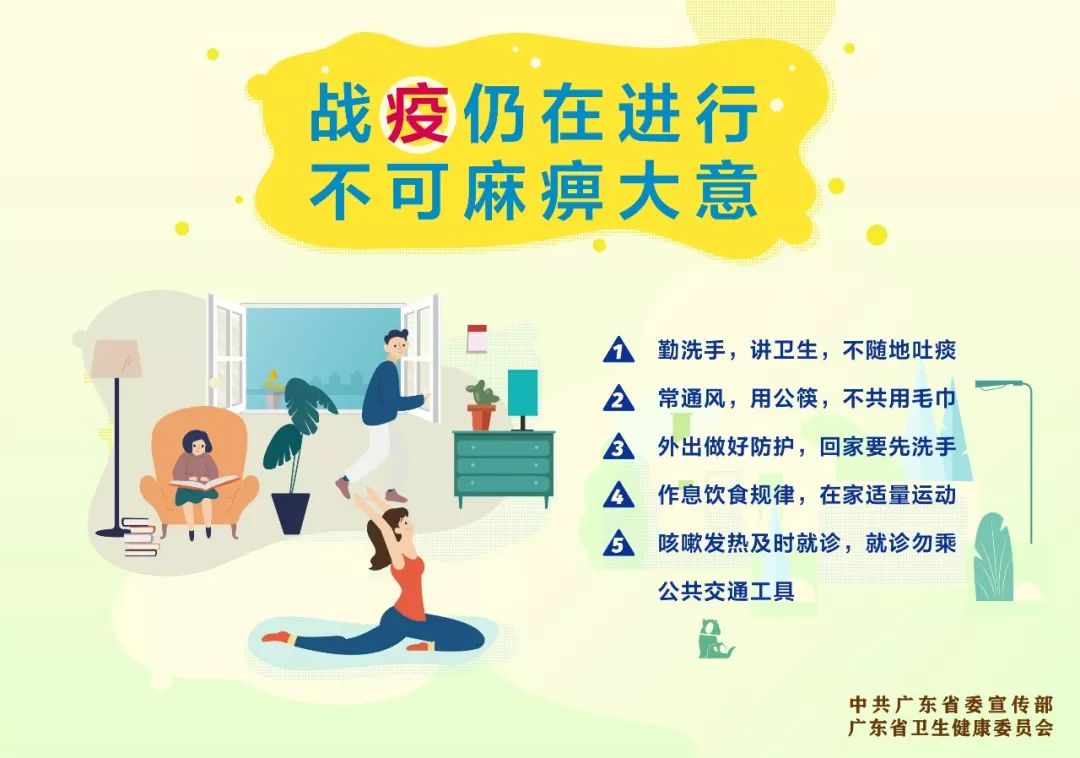
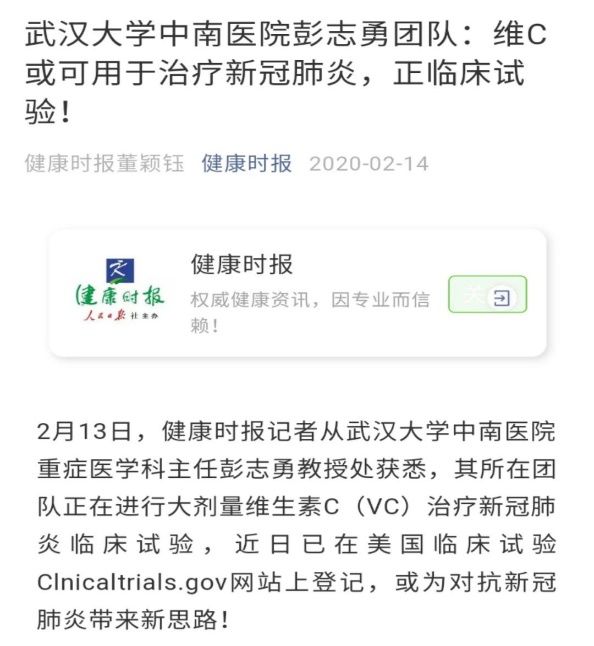
According to a report from Health Times on February 14, the team led by Professor Peng Zhiyong at Zhongnan Hospital of Wuhan University is conducting clinical trials on high-dose Vitamin C treatment for COVID-19, suggesting that Vitamin C may be used for treating COVID-19.
Professor Peng Zhiyong explained that the dosage of Vitamin C used in their clinical trials is 24g, administered twice a day, with each dose being 12g. For critically ill patients, intravenous Vitamin C can be used, while mild patients can take it orally.
It is understood that this clinical trial has recently been registered on the Clinicaltrials.gov website in the United States.
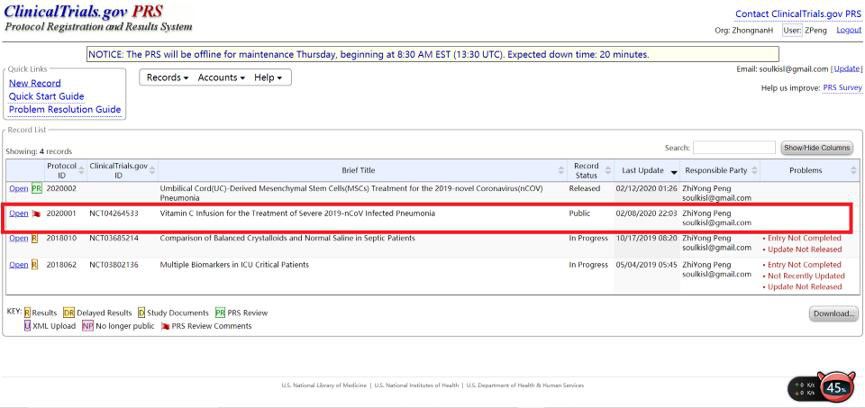
(Source: Clinicaltrials.gov)
So the question arises: in the general public’s understanding, Vitamin C is known for its antioxidant effects, but what is its pharmacological mechanism for treating COVID-19? What are the dosages and efficacy? Can it enhance immunity or prevent infection for those not infected with COVID-19? With these questions in mind, pharmacists have reviewed relevant literature. Let’s take a look.


Vitamin C, also known as ascorbic acid, is a water-soluble vitamin that participates in the synthesis and metabolism of various substances. It is an indispensable part of the biosynthesis of collagen, carnitine, neurotransmitters, etc. It is absorbed in the small intestine via sodium-dependent Vitamin C transporters (SVCT1) and is excreted through the kidneys. The human body cannot synthesize Vitamin C on its own, so it needs to be regularly consumed in adequate amounts from food. The normal range of Vitamin C in serum is 40-60μmol/L, and levels below 11μmol/L indicate Vitamin deficiency.
The Institute of Medicine (IOM) and the Office of Dietary Supplements in the United States propose that the tolerable upper intake level (UL) for Vitamin C is 2000mg/day, which refers to the maximum daily dose unlikely to cause adverse health effects in the general population.
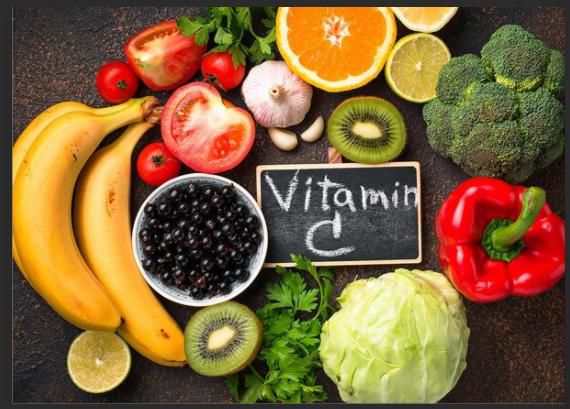
COVID-19 (Coronavirus Disease 2019) is actually a self-limiting disease.
A self-limiting disease refers to certain viral infections and autoimmune diseases that can recover through the body’s immune regulation. Common diseases include respiratory syncytial virus pneumonia, rhinovirus, adenovirus, coronaviruses, influenza virus, and parainfluenza virus, including the currently prevalent COVID-19, which is primarily treated with symptomatic and supportive care.
In other words, the use of Vitamin C is not recommended for mild patients; only critically ill patients may consider receiving 6g/day of Vitamin C. In patients infected with COVID-19, some may experience rapid deterioration due to a cytokine storm (inflammatory storm) in the body, which is related to the clinical progression of severe COVID-19 patients and multiple organ dysfunction. To prevent and treat the cytokine storm, large doses of Vitamin C are mentioned in the “Consensus of Experts on Comprehensive Rescue for COVID-19 in Shanghai” and the “Expert Consensus on Rational Drug Use in COVID-19 (Third Edition)”: Vitamin C at 100-200mg/kg daily, administered intravenously, with the duration of use aimed at significant improvement in oxygenation indices.
(1) Numerous studies have shown that acute diseases, endotoxemia, and sepsis can lead to rapid depletion of Vitamin C, characterized by low serum and intracellular levels of Vitamin C. Critically ill patients often require exogenous Vitamin C supplementation due to increased oxidative metabolic consumption, reduced absorption, and increased urinary loss.
(2)Antioxidant Effect: Vitamin C primarily reduces endothelial oxidative stress by inhibiting the expression of superoxide in microvascular endothelial cells, improving endothelial dysfunction and enhancing microvascular blood flow.
(3)Anti-inflammatory Effect: Animal experiments have shown that Vitamin C supplementation can improve the antioxidant capacity of the body after abdominal infection, reduce oxidative damage, and significantly increase the survival rate of mice during acute inflammation. In vitro studies on cultured microvascular endothelial cells found that 100μmol/L of Vitamin C can maximally inhibit bacterial replication.
(4)Immune Modulation: From an immunological perspective, Vitamin C can enhance lymphocyte proliferation and promote the proliferation of peripheral blood CD8+ memory T cells. Vitamin C improves cellular immunity in septic mice, significantly inhibiting the negative immunoregulatory effects of regulatory T cells, and enhances the prognosis and organ dysfunction caused by sepsis. Additionally, Vitamin C can stimulate the production of interferon, increase the phagocytic and oxidative clearance abilities of neutrophils, and promote lymphocyte proliferation, thereby enhancing the body’s immune function.
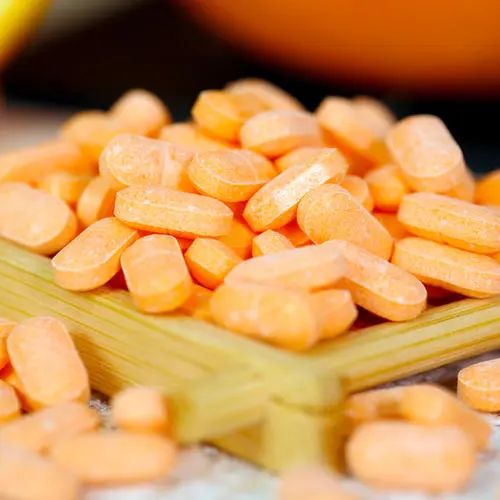
In addition to these in vitro studies, numerous clinical trials have found that high-dose Vitamin C, either alone or in combination with other medications such as Vitamin E, selenium, zinc, and Vitamin B in critically ill patients, can reduce the incidence of lung disease and organ dysfunction, decrease the duration of mechanical ventilation, and shorten ICU and/or hospital stays.
In the clinical trial of high-dose Vitamin C treatment for COVID-19 conducted by Professor Peng Zhiyong’s team at Zhongnan Hospital of Wuhan University, the dosage of Vitamin C used is 24g, administered twice daily, with each dose being 12g. The expert consensus mentions a dosage of 6g/day. Reports on Vitamin C usage vary from 2g to 24g. Some studies indicate that in critically ill patients, serum Vitamin C levels are often undetectable, and an oral dose of 1500mg of Vitamin C cannot restore levels to normal (40-60μmol/L). Therefore, to achieve normal levels, daily doses must exceed 3g. Based on pharmacokinetic data and preliminary dose-response data, Professor Marik recommends a daily dose of 6g for critically ill patients.
Two small clinical studies have used very high doses of Vitamin C (66mg/kg/h, 100-150g/day) for 24 hours in burn patients without significant adverse reactions. Some studies have shown that high doses of Vitamin C have been proven to increase the excretion of calcium, iron, and manganese in urine, potentially increasing the risk of kidney stone formation; the metabolic end product of Vitamin C is oxalate, thus long-term high-dose intravenous use may increase oxalate or uric acid levels in urine, leading to oxalate nephropathy or even renal failure. However, intravenous Vitamin C is unlikely to harm renal function in patients without renal dysfunction, while caution should be exercised in patients with pre-existing kidney disease. There have also been reports of hemolysis cases with high-dose Vitamin C; patients with glucose-6-phosphate dehydrogenase (G6PD) deficiency should use it cautiously, and it is recommended to start with a low dose and administer it slowly intravenously, while checking G6PD levels before treatment.
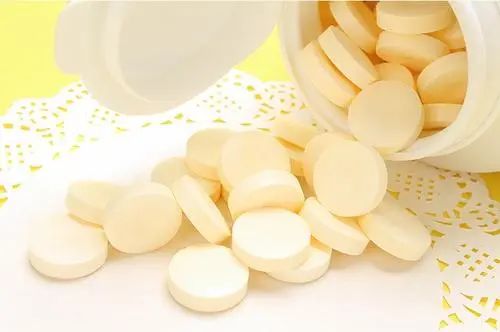
Currently, there is no reliable clinical evidence or guidelines that clearly recommend a dosage, and more high-level research evidence is needed.
We all know that the cause of the common cold is not catching a chill, but rather a viral infection, mainly rhinovirus and coronavirus, which generally do not require treatment. There has been a long-standing belief that “Vitamin C prevents and treats colds” among the public, which interestingly did not originate from doctors but from a chemist. In 1970, a book titled “Vitamin C and the Common Cold” was published, authored by the famous American chemist Linus Pauling. In this book, Pauling wrote that taking 1 gram of Vitamin C daily could prevent colds. This new viewpoint immediately caused a sensation and was embraced by many readers, but it also faced skepticism and opposition. The American Health Foundation warned readers: “The claim that taking more than 1000mg of Vitamin C daily can prevent colds is not sufficiently supported by evidence.” The American Medical Association also issued a statement: “Vitamin C cannot prevent or treat colds!” In particular, a 2013 meta-analysis of 29 related trials found that regular supplementation of Vitamin C does not significantly reduce the incidence of colds. For those already suffering from a cold, Vitamin C may reduce the duration of the cold, but further research is needed on the treatment effects and dosages.
It can be seen that, based on current research, supplementation of Vitamin C does not prevent colds for the general public, although it may reduce the duration of colds.
Vitamin C is an important trace element in the body, essential for maintaining normal physiological functions. Currently, there are no authoritative guidelines or evidence recommending its use for COVID-19 infection, and further clinical trials are needed to verify this. For individuals not infected, the best sources of Vitamin C are natural fruits and vegetables. It must be noted that therapeutic doses of Vitamin C range from 2g to 24g, while the recommended daily dietary intake is only 100mg. Excessive supplementation may lead to side effects.
References
[1] National Health and Family Planning Commission. Notice on Printing and Distributing the “Diagnosis and Treatment Plan for COVID-19 (Trial Version 7)” (Guo Wei Ban Yi Han [2020] No. 145)
[2] Liu Jiao, Chen Erzhen, et al. Expert recommendations for nutritional support therapy in severe COVID-19 patients. Chinese Journal of Critical Care Medicine, 2020, 6(0): E013.
[3] McNamara R, Deane AM, Anstey J, et al. Understanding the rationale for parenteral ascorbate (vitamin C) during an acute inflammatory reaction: a biochemical perspective [J]. Crit Care Resusc, 2018, 20(3): 174-179.
[4] Shanghai Expert Group for COVID-19 Clinical Treatment. Consensus on Comprehensive Rescue for COVID-19 in Shanghai [J/OL]. Chinese Journal of Infectious Diseases, 2020, 38 (2020-03-01)
[5] Guangdong Provincial Drug Administration Quality Control Center. Expert Consensus on Rational Drug Use in COVID-19 (Third Edition). 2020.03.06
[6] Borrelli E, Roux-Lombard P, Grau GE, et al. Plasma concentrations of cytokines, their soluble receptors, and antioxidant vitamins can predict the development of multiple organ failure in patients at risk [J]. Crit Care Med, 1996, 24 (3): 392-397.
[7] Evans-Olders R, Eintracht S, Hoffer LJ. Metabolic origin of hypovitaminosis C in acutely hospitalized patients [J]. Nutrition, 2010, 26 (11-12): 1070-1074.
[8] Oudemans-van Straaten HM, Spoelstra-de Man AM, de Waard MC. Vitamin C revisited[J] Crit Care, 2014, 18(4): 460
[9] Armour J, Tyrol K, Lidington D, et al. Ascorbate prevents microvascular dysfunction in the skeletal muscle of the septic rat [J]. J Appl Physiol, 2001, 90(3): 795-803.
[10] Gao YL, Lu B, Zhai JH, et al. The parenteral vitamin C improves sepsis and sepsis-induced multiple organ dysfunction syndrome via preventing cellular immunosuppression[J]. Mediators Inflamm. 2017, 2017: 4024672.
[11] Wagner SC, Markosian B, Ajili N, et al. Intravenous ascorbic acid as an adjuvant to interleukin-2 immunotherapy[J]. J Transl Med, 2014, 12: 127
[12] Marik PE, Khangoora V, Rivera R, Hooper MH, Catravas J. Hydrocortisone, vitamin C, and thiamine for the treatment of severe sepsis and septic shock: a retrospective before-after study. Chest. 2017;151(6):1229–38.
[13] Tanaka H, Matsuda T, Miyagantani Y, Yukioka T, Matsuda H, Shimazaki S: Reduction of resuscitation fluid volumes in severely burned patients using ascorbic acid administration: a randomized, prospective study. Arch Surg 2000, 135:326–331.
[14] Kahn SA, Beers RJ, Lentz CW: Resuscitation after severe burn injury using high-dose ascorbic acid: a retrospective review. J Burn Care Res 2011, 32:110–11
[15] Thomas LD, Elinder CG, Tiselius HG, et al. Ascorbic acid supplements and kidney stone incidence among men: a prospective study[J]. JAMA Intern Med, 2013, 173(5): 386—388.
[16] Ohno S, Ohno Y, Suzuki N, et al. High-dose vitamin C (ascorbic acid) therapy in the treatment of patients with advanced cancer. Anticancer Res, 2009, 29(3):809.
[17] Hemila H, Chalker E. Vitamin C for preventing and treating the common cold. Cochrane Database of Syst Rev 2013; 1:CD000980
[1] National Health and Family Planning Commission. Notice on Printing and Distributing the “Diagnosis and Treatment Plan for COVID-19 (Trial Version 7)” (Guo Wei Ban Yi Han [2020] No. 145)
[2] Liu Jiao, Chen Erzhen, et al. Expert recommendations for nutritional support therapy in severe COVID-19 patients. Chinese Journal of Critical Care Medicine, 2020, 6(0): E013.
[3] McNamara R, Deane AM, Anstey J, et al. Understanding the rationale for parenteral ascorbate (vitamin C) during an acute inflammatory reaction: a biochemical perspective [J]. Crit Care Resusc, 2018, 20(3): 174-179.
[4] Shanghai Expert Group for COVID-19 Clinical Treatment. Consensus on Comprehensive Rescue for COVID-19 in Shanghai [J/OL]. Chinese Journal of Infectious Diseases, 2020, 38 (2020-03-01)
[5] Guangdong Provincial Drug Administration Quality Control Center. Expert Consensus on Rational Drug Use in COVID-19 (Third Edition). 2020.03.06
[6] Borrelli E, Roux-Lombard P, Grau GE, et al. Plasma concentrations of cytokines, their soluble receptors, and antioxidant vitamins can predict the development of multiple organ failure in patients at risk [J]. Crit Care Med, 1996, 24 (3): 392-397.
[7] Evans-Olders R, Eintracht S, Hoffer LJ. Metabolic origin of hypovitaminosis C in acutely hospitalized patients [J]. Nutrition, 2010, 26 (11-12): 1070-1074.
[8] Oudemans-van Straaten HM, Spoelstra-de Man AM, de Waard MC. Vitamin C revisited[J] Crit Care, 2014, 18(4): 460
[9] Armour J, Tyrol K, Lidington D, et al. Ascorbate prevents microvascular dysfunction in the skeletal muscle of the septic rat [J]. J Appl Physiol, 2001, 90(3): 795-803.
[10] Gao YL, Lu B, Zhai JH, et al. The parenteral vitamin C improves sepsis and sepsis-induced multiple organ dysfunction syndrome via preventing cellular immunosuppression[J]. Mediators Inflamm. 2017, 2017: 4024672.
[11] Wagner SC, Markosian B, Ajili N, et al. Intravenous ascorbic acid as an adjuvant to interleukin-2 immunotherapy[J]. J Transl Med, 2014, 12: 127
[12] Marik PE, Khangoora V, Rivera R, Hooper MH, Catravas J. Hydrocortisone, vitamin C, and thiamine for the treatment of severe sepsis and septic shock: a retrospective before-after study. Chest. 2017;151(6):1229–38.
[13] Tanaka H, Matsuda T, Miyagantani Y, Yukioka T, Matsuda H, Shimazaki S: Reduction of resuscitation fluid volumes in severely burned patients using ascorbic acid administration: a randomized, prospective study. Arch Surg 2000, 135:326–331.
[14] Kahn SA, Beers RJ, Lentz CW: Resuscitation after severe burn injury using high-dose ascorbic acid: a retrospective review. J Burn Care Res 2011, 32:110–11
[15] Thomas LD, Elinder CG, Tiselius HG, et al. Ascorbic acid supplements and kidney stone incidence among men: a prospective study[J]. JAMA Intern Med, 2013, 173(5): 386—388.
[16] Ohno S, Ohno Y, Suzuki N, et al. High-dose vitamin C (ascorbic acid) therapy in the treatment of patients with advanced cancer. Anticancer Res, 2009, 29(3):809.
[17] Hemila H, Chalker E. Vitamin C for preventing and treating the common cold. Cochrane Database of Syst Rev 2013; 1:CD000980
Source: Chaozhou Health and Family Planning Bureau

